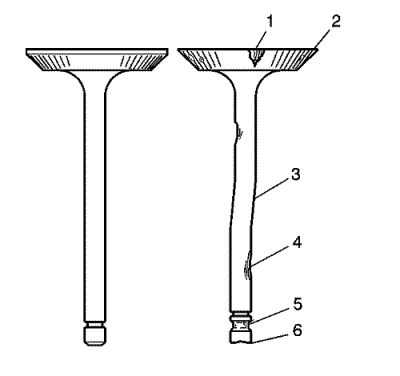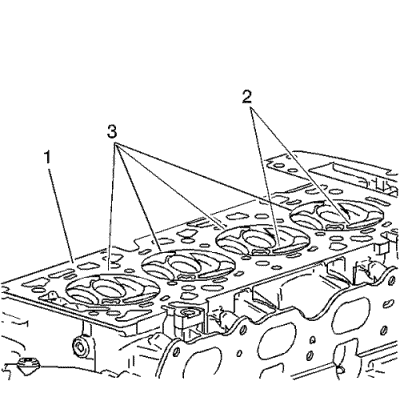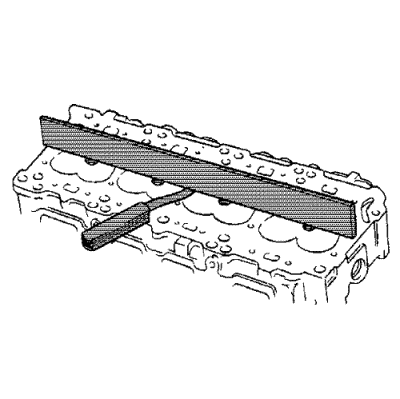Cylinder Head Cleaning and Inspection
Valve Cleaning and Inspection

Warning: Bodily injury may occur if the cleaning solvent is inhaled or exposed to the skin.
Note: Do not scratch the valve stem with the wire brush.
- Clean the valves of carbon, oil and varnish. Carbon can be removed with a wire brush. Varnish can be removed by soaking in Parts Immersion Solvent.
- Clean the valve guides.
- Inspect the valve stem for wear (4).
- Inspect the valve key groove for chipping or wear (5). Replace the valve if chipped or worn.
- Inspect the valve face for burning or cracking (1). If pieces are broken off, inspect the corresponding piston and cylinder head area for damage.
- Inspect the valve stem for burrs and scratches. Burrs and minor scratches may be removed with an oil stone.
- Inspect the valve stem for straightness and the valve head for bending or distortion (3) using V blocks. Bent or distorted valves must be replaced.
- Clean the deposits from the valve face. Inspect the valve face for grooving.
- Replace the valve if the face is grooved. Valve faces cannot be machined. If worn, or damaged, the valves must be replaced.
- The valves may be lightly lapped to the valve seats.
Cylinder Head and Gasket Surface Cleaning and Inspection
- Remove the spark plugs. Refer to Spark Plug Replacement .
- Inspect the cylinder head gasket and mating surfaces for leaks, corrosion and blow-by. If the gasket has failed, use the following faults to determine the cause:
| • | Loose or warped cylinder head |
| • | Missing, off location or not fully seated dowel pins |
| • | Corrosion in the seal area around the coolant passages |
| • | Chips or debris in the cylinder head bolt holes |
| • | Bolt holes in the cylinder block not drilled or tapped deep enough |

- Inspect the cylinder head gasket surface.
| • | Cylinder head may be reused if corrosion is found only outside a 4 mm (0.375 in) band around each combustion chamber (1). |
| • | Replace the cylinder head if the area between the valve seats is cracked (2). |
| • | Replace the cylinder head if corrosion has been found inside a 4 mm (0.375 in) band around each combustion chamber (3). |
- Clean the cylinder head bolts.
Note: Do not use a wire brush on any gasket sealing surface.
- Clean the cylinder head. Remove all varnish, soot and carbon to the bare metal.
- Clean the valve guides.
- Clean the threaded holes. Use a nylon bristle brush.
- Clean the remains of the sealer from the plug holes.
- Inspect the cylinder head bolts for damaged threads or stretching and damaged heads caused by improper use of tools.
- Replace all suspect bolts.
- Inspect the cylinder head for cracks. Check between the valve seats and in the exhaust ports.
Note: Do not attempt to weld the cylinder head, replace it.
- Inspect the cylinder head deck for corrosion, sand inclusions and blow holes.

- Inspect the cylinder head deck surface for flatness. Refer to Fastener Tightening Specifications . If the cylinder head is out of specification, replace the cylinder head. Do not machine the cylinder head.
- Inspect all the threaded holes for damage. Threads may be reconditioned with thread inserts.
- Inspect the sealing surfaces.
- Inspect the cylinder head plugs.
| © Copyright Chevrolet. All rights reserved |


